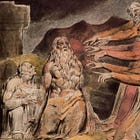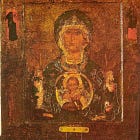G.K. Chesterton said something to the effect that The Iliad is great because all of life is a battle; The Odyssey is great because all life is a journey; The Book of Job because all of life is a riddle. On the latter note, I would add that life is also a trial and a crucible of transformation, as I have argued before.
In this same spirit, we could observe that The Book of Genesis is great because life is an origin, a temptation, and a fall, and that the Gospels are great because life is a redemption. To the above assortment we could add the Stoic maxim that all of life is for the sake of cultivating virtue, or the Epicurean one that it is for experiencing pleasure, or the Christian one that it is purifying our likeness to God in the image of Jesus Christ, and so on. Note that each of these views of life entails an implicit standard of success, or Good. Success in a battle, for instance, means vanquishing your enemy while success in a journey means completing it. Hence, the question really concerns paradigms of life, which is to say, Ideas of the Good.
If we again consider the different outlooks indicated above, which is by no means intended as an exhaustive survey of all the ideas of the Good, we should observe how they are in a certain sense incommensurable. In other words, it’s impossible to translate a metric of success in one into a comparable metric in another. Insofar as life is a battle, its not obvious how the “distance I’ve travelled on the journey” can be converted to slaying Trojans. Of course, by alluding to “the incommensurability of paradigms,” I am hearkening to the work of the philosopher Thomas Kuhn, who famously explicated the revolutionary model of scientific progress, in which all apparent progress is local and contingent to a paradigmatic reference frame. Kuhn explains that a scientific paradigm, often tacitly assumed, structures and orders the entire research program of a given scientific community:
But paradigms differ in more than substance, for they are directed not only to nature but also back upon the science that produced them. They are the source of the methods, problem-field, and standards of solution accepted by any mature scientific community at any given time. As a result, the reception of a new paradigm often necessitates a redefinition of the corresponding science. Some old problems may be relegated to another science or declared entirely “unscientific.” Others that were previously nonexistent or trivial may, with a new paradigm, become the very archetypes of significant scientific achievement. And as the problems change, so, often, does the standard that distinguishes a real scientific solution from a mere metaphysical speculation, word game, or mathematical play. The normal-scientific tradition that emerges from a scientific revolution is not only incompatible but often actually incommensurable with that which has gone before.
He then illustrates the ordering function that paradigms serve in respect to our perception of the world to the effect that “the world” of one paradigm is not necessarily the same world as that of another:
The child who transfers the word ‘mama’ from all humans to all females and then to his mother is not just learning what ‘mama’ means or who his mother is. Simultaneously he is learning some of the differences between males and females as well as something about the ways in which all but one female will behave toward him. His reactions, expectations, and beliefs—indeed, much of his perceived world—change accordingly. By the same token, the Copernicans who denied its traditional title ‘planet’ to the sun were not only learning what ‘planet’ meant or what the sun was. Instead, they were changing the meaning of ‘planet’ so that it could continue to make useful distinctions in a world where all celestial bodies, not just the sun, were seen differently from the way they had been seen before.
People are scandalized by the prospect that modern science should be relativized and considered as something other than absolutely correct. But scientific consensus has always evolved through all of history: why should we imagine that we live in the single privileged moment in which it suddenly took hold of the absolute unvarnished truth? On top of this, science really has no standard of correctness other than predictive utility.
Enough about this, because the real question is not one of scientific paradigms, but of how an understanding of scientific paradigms can serve to shed light on the nature of paradigms of life.
As indicated, a scientific paradigms provides a sort of grammar of coherence to our perceptions of nature. Similarly, a paradigm of life allows us to subsume each apparently discrete event or narrative in our lives into a meta-narrative that compasses the whole of them in one sweep. Every paradigm of life is teleologically constituted, just like life itself.
That is to say that every paradigm of life is defined by the end towards which it tends. Again, for “the battle,” this is victory, for “the journey,” its destination. Someone could of course quibble with this statement and argue that the journey is not only about the end of the journey, but also about the experiences, trials, and development that accompanies the traveler along the way. But this says nothing whatsoever about the fundamental issue at stake, which is precisely the teleological nature of these existential frames of reference, and that is the point I wish to establish here rather than to dispute the particular tenets of any individual one of them.
But in spite of the apparent diversity of aspects, there is one transcendent, absolute frame, that transcends and reconciles all of them together even as a hen gathers her chickens under her wings or, more aptly, as all existing things are subsumed by Existence as such. That is, we should be striving to identify our will, our love, our desire, our Idea of the Good—which, from this standpoint are the same thing—with God’s will, God’s love, God’s desire, God’s idea of the Good. Love is an assent of the will, and the intellect which, through its capacity to conceive of the idea of the Good, tells our will what to assent to in this way. Hence, we need to strive to identify our idea of the Good with God’s idea of the Good to the effect that we will love the same things as he does and thus our love will also be identical with his love.
Now it might be argued that this is an opinion and that, therefore, it might be right from its own side but that it oversteps the bounds of rationality to claim the title of “absolute frame” for any single one of these paradigmata, including this so-called “transcendent one.” However, the above is not merely one more standpoint among others, and therefore not comparable to the statement “life is a battle.” As indicated, it is transcendent to all such statements. It is also transcendental to them in that it constitutes the basis for establishing such existential frames of reference as such.
It is axiomatic, given the word “God,” that this is the highest standard and perfection that can be conceived. To say “God wants me to do one thing but I prefer to do something else” is like saying “I am traveling to San Francisco by boat and I am traveling there by plane instead.” That is, it is possible to say each of these words, and even mean each of them, but it is not possible to mean them altogether. When somebody says, “I would rather do something other than what God has in store for me,” they are only demonstrating that they don’t understand what “God” means. It might be objected that someone might not believe in the existence of God altogether, but the point is moot because an atheist would never say something like this to begin with and, moreover, betrays a feature of his own psychology by his rejection of God’s existence rather than one about Being.1 Hence, in principle, we should desire nothing other for ourselves other than what God desires for us so that his desire and our desire are one desire.
But there is a fly in the ointment vis-à-vis establishing our paradigm of life as the attempt to identify our love and our will with God’s love and God’s will. Namely, in many cases, we don’t, to begin with, know what this is. Again, consider that love is always awakened by a perception of the Good. We can’t love a Good that we can’t see. In other words, if we are to love the Good that God loves, we need to learn to see the Good that God sees. Recall that love is an assent of the will, and the intellect tells our will what to assent to in this way. The extent to which we can attain to God’s desire is measured by the extent to which we have attained to God’s vision. By this path, we are led back to the question of the Idea of the Good, which was treated more thoroughly in this piece.
Suffice it to note that our lives are ordered by our Ideas of the Good, whether conscious or tacit, and to observe that, interestingly, the Latin video or videre shares an etymological relation with the wis- in the Saxon word “wisdom” was well as the Greek word eidos (εἶδος) or idea (ἰδέα), which are the masculine and feminine forms, respectively, of a single term. I have argued before that the etymological connection is not accidental or spurious but allows for a consilience in our comprehension of these ideas through a sort of triangulation of them. Wisdom just is the Idea of the Good, and “Christ the power of God, and the wisdom of God”—God in his aspect perceptible to our vision.
The idea of something is the condition for us to perceive instances of that thing. Hence, when we speak of the idea of the Good, we are talking about the capacity in us to perceive the Good and, by extension, the ordering function of our love and will and desire and action.2 Of course, all of our love is, as stated, axiomatically ordered towards the perceived Good. If this perception is correct, then we will love the Good everywhere it can be found, just like God does. Indeed, our love will be the same as God’s love, just as a member of a choir can listen to the choirmaster and then sing the identical tune. And going further, not only will we love as God does, but all of our love will be for God, who is the cause and author of Goodness, and robes himself in the Good like a garment. Thus, when our love is correct, our loving God just is God loving himself. Thus, as Meister Eckhart stated, we should go out of ourselves to let God come in and love himself in us. God is the paradigmatic singularity, and thus it stands to reason that whereas human love consists in going out of oneself—displacing the center of concern that we ordinarily cling to and hold close to our chests onto another being—that in God the standard pattern breaks down: God loves the Good everywhere it is to be found, but the Good just is an energy of his own being. God’s love is self-referential.
What if we don’t love God enough or love ourselves too much (which are the same thing) to do that? Then we should wish to be freed from this perversion of our love and wish to be perfected in the same. What if we don’t wish to be freed from this perversion and to have our love perfected in God? Then we should wish to wish for it, which is already God taking effect on us to reveal his image in the soul, and thus “we are changed into the same image, from glory to glory, even as by the Spirit of the Lord.”

Probably either pridefulness or literal-mindedness, and they ordinarily fit hand-in-glove
Evil is nothing more nor less than a depraved idea of the Good and subsequent perversion of love to the effect that things seem good to us to do that are in fact the opposite of that. Virtue, then, and beatitude, and blessedness, is the perfection of the same to the corresponding effect that we love the things we ought to love.









Though it is marginal to the point you make in this essay, εἶδος and ἰδέα are not the masculine and feminine forms, respectively, of a single term. One is neuter, the other is gendered. While I am not yet certain about their respective nuances of meaning, I am certain that these can't be identical in the consciousness of ancient Greece, precisely because of this differentiation gendered/not gendered.
"Love is soche a might that it makith alle thing comoun."
—The Cloud of Unknowing